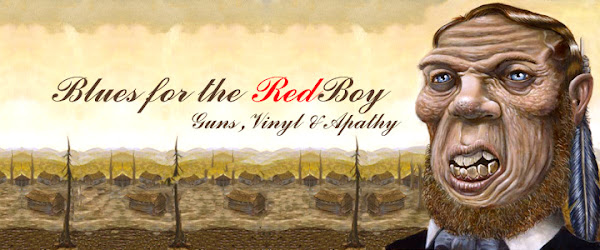
I know, I know; they are fragile as all get out, and unless you are extremely blessed to find some new old store stock (i.e. stepped in shit), they sound like said previously mention shit run over twice. But if music is 'soul', then the humble 78 can only be described as the bones of music. Hell, there is even an organic component to the 78 in the guise of the humble shellac beetle, thus making 78s the fossilized remains of the Pleistocene era of music. Funny that even in those primordial times, there was still a novelty to be had from being scared.

First up on BFTRB's month long Halloween spectacular is an early celluloid curiosity in the guise of a dramatic reading of 1908's Dr. Jekyll & Mr. Hyde. Widely believed to be one of the first horror movies ever produced (the first being 1896's Le Manoir Du Diable, directed by French film visionary Georges Melies), director Otis Turner's faithful interpretation of Richard Mansfield's popular stage play (Itself based on the Robert Louis Stevenson novella) is an early experiment in Victorian theatricality and abnormal psych, or at least it might be. Trouble is nobody has ever actually seen it. And unless somebody unearths a vinegar-choked copy out of a box of garage sale porn loops, then you'll just have to make do with this ambitious, if not absurdly melodramatic recording of Jekyll's transformation scene and Edward Hyde’s impending death.
This recording pretty much matches word for word the Mansfield play, and as the source material for Otis's screen adaptation, should give a pretty good indication of how the transformation scene and climax would have played out in the 1908 feature.
 There allegedly exists an Edison Cylinder of such a scene recorded by one Len Spencer. Although yet to be authenticated, if the existence of this material were to prove true, then this would make the Jekyll/Hyde 78 (itself, uncredited) a later, though still extremely early re-press promoting the new medium of recorded sound (if you have ever owned cylinders, then you know how much of a pain in the dick they can be). Either way, it is a fascinating look at the fading influence of Victorian culture with regard to the emerging horror market.
There allegedly exists an Edison Cylinder of such a scene recorded by one Len Spencer. Although yet to be authenticated, if the existence of this material were to prove true, then this would make the Jekyll/Hyde 78 (itself, uncredited) a later, though still extremely early re-press promoting the new medium of recorded sound (if you have ever owned cylinders, then you know how much of a pain in the dick they can be). Either way, it is a fascinating look at the fading influence of Victorian culture with regard to the emerging horror market.--------------------------------------------------------------------------------
Dr. Jekyll & Mr. Hyde (Transformation Scene & Dramatic Talking)
--------------------------------------------------------------------------------
Note: Dig this surviving clip of the 1912 adaptation of Jekyll / Hyde. Play the two together a have yourself a ‘Dark Side of Oz’ experience.

Next up in the unbreakable / breakable category we have the original version {citation needed} of a perennial BFTRB favorite, David Gardner’s the Mad Witch, or, in this incarnation, the Old Mad Witch.
 Lord knows how sportscaster Mel Allen got his name (and voice) all over this weird disc, but I did not even know it existed until a tip from ole’ Devil Dick; in itself a funny story which I’m sure he would love to elaborate on as it paints me in a shitty light (Sorry DD, but time waits for no man). Like Hernando Hideaway (Oley!), ‘witch’ enjoys some heavy castanets and alto sax and though it has a decidedly more mambo / samba flavor to this 1947 cut, it’s cool to hear an earlier take on a Halloween Favorite.
Lord knows how sportscaster Mel Allen got his name (and voice) all over this weird disc, but I did not even know it existed until a tip from ole’ Devil Dick; in itself a funny story which I’m sure he would love to elaborate on as it paints me in a shitty light (Sorry DD, but time waits for no man). Like Hernando Hideaway (Oley!), ‘witch’ enjoys some heavy castanets and alto sax and though it has a decidedly more mambo / samba flavor to this 1947 cut, it’s cool to hear an earlier take on a Halloween Favorite.----------------------------------------------------------------------------------
Old Mad Witch - Mel Allen
----------------------------------------------------------------------------------
Stay tuned the rest o’ the month for some ridiculously juvenile Halloween garbage both here and over at the Devil’s Music, including a forthcoming joint Halloween throw down. It’ll be a hoot! {Citation needed}














